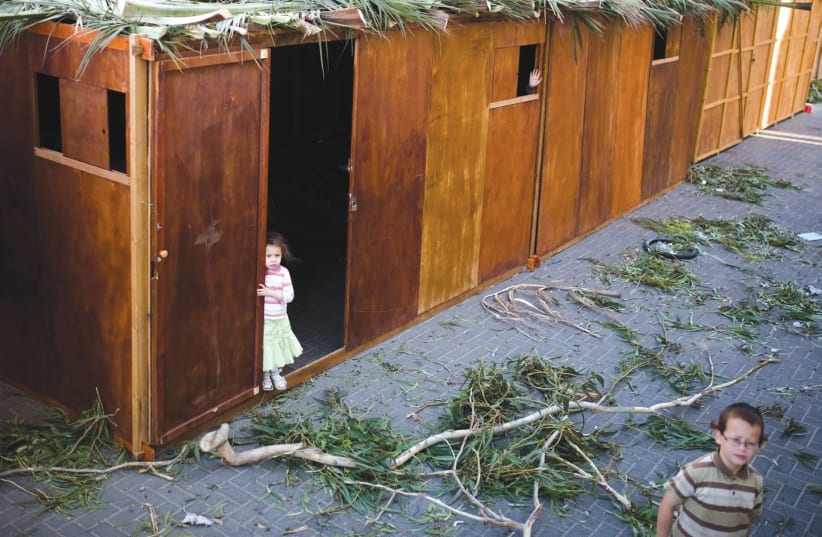In a wider perspective, the life of every Jew is meant to be shaped during Tishrei. We experience this festive process differently every year, for every year has its own outlook. We grasp different understandings every year, have different experiences, and our characters develop – all these join this sequence of holidays and allow us to “breathe in” the special ambience of Tishrei and absorb it anew.
The Tishrei holidays start with Rosh Hashana, continue with Yom Kippur, go on to Sukkot, and culminate with Simhat Torah. This is a sequence that is not obvious. On the face of it, the stages in the sequence seem contradictory.
Rosh Hashana and Yom Kippur are serious days with a somewhat heavy ambience. On Rosh Hashana we declare – by blowing the shofar and through the special prayers of these days – that we accept God’s kingship.
Accepting God’s kingship is not taken lightly or inattentively; it is a serious event and therefore so is the general feeling of Rosh Hashana in synagogues and homes. The holiday joy is tempered by gravity and deliberateness.
Yom Kippur is also not a simple day. It is a day of self-scrutiny, of standing exposed before God as we recognize our weaknesses and the actions we might have preferred to repress. Yom Kippur is not a sad day, but it is serious and demands focus and responsibility.
The next stage is Sukkot which, surprisingly, has a completely opposite character. The days of Sukkot are happy and joyful. We celebrate with festive meals, and music and dancing are prevalent.
The ambience of Sukkot in Jewish communities is reminiscent of a lively festival. We sit in decorated booths, meet with friends and family, perhaps accompanied by a glass of wine.
This ambience stems from a directive we read in the Torah: “And you shall rejoice before the Lord your God for a seven day period…For a seven day period you shall live in booths.” (Leviticus 23:40-42).
Already thousands of years ago, Sukkot in the Temple was characterized this way. On every night of the festival celebrated in the Temple – a place characterized by restraint and solidity throughout the year – there would be a Simhat Beit Hashoeva (Celebration of the Water-Drawing). The greatest sages and priests would dance and play music and even do tricks to increase the joy.
“Whoever has never seen Simhat Beit Hashoeva,” said the sages, “has never seen joy in his life” (Tractate Sukka, Chapter 5, Mishna 1).
Can Sukkot be seen as another link connected to Rosh Hashana and Yom Kippur, or does it contrast with them? How can this happy holiday join the serious and heavy days that precede it?
As we mentioned, the series of Tishrei holidays inspires us to think about the process we experience. In this process, we are apparently meant to go through different, perhaps even contradictory, stages. One of the facets of this process, perhaps the main one, is: standing before God.
The way a person of faith deals with the presence of God in his or her life can be composed of contradictory facets.
On the one hand, God’s presence in our lives is solemn and serious. It is in no way simple. Faith demands of us to be honest, to act with integrity and advance the world through a sense of responsibility and awareness of the mission we have been given. On the other hand, which may seem like a contradiction, God’s presence in our lives is the presence of goodness, of endless love; God has compassion for us and wants what is good for us. This sort of presence causes us to feel happy and serene, giving us a sense of calming security.
The month of Tishrei shapes how we stand before God. We start the month with days that are serious and obliging and move on to days that are happy and secure. These are different levels of faith, but the order is not a coincidence.
It would be wrong to stand before God by going directly to the second level before we have strengthened and secured the first. At the beginning of the month, we experience days of Divine presence, whose main significance is commitment and seriousness.
We recognize the responsible mission we have been given as part of humanity in general and as Jews in particular. Only after we have internalized this level can we move onto the next level, when God’s presence is the source of embracing love and a celebration of joy.
Sukkot is an invitation to every Jew to enter the sukka, feel God’s loving embrace, smell the blessed winter approaching, and celebrate in an ambience of security and faith.
The writer is rabbi of the Western Wall and Holy Sites
